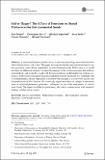Files in this item
Sad or happy? The effects of emotions on stated preferences for environmental goods
Item metadata
| dc.contributor.author | Hanley, Nick | |
| dc.contributor.author | Boyce, Christopher | |
| dc.contributor.author | Czajkowski, Mikołaj | |
| dc.contributor.author | Tucker, Steve | |
| dc.contributor.author | Noussair, Charles | |
| dc.contributor.author | Townsend, Michael | |
| dc.date.accessioned | 2016-07-20T09:30:18Z | |
| dc.date.available | 2016-07-20T09:30:18Z | |
| dc.date.issued | 2017-12 | |
| dc.identifier | 244239828 | |
| dc.identifier | 19e1467e-476b-4202-8a06-947b9e4220d7 | |
| dc.identifier | 84978645929 | |
| dc.identifier | 000416801700001 | |
| dc.identifier.citation | Hanley , N , Boyce , C , Czajkowski , M , Tucker , S , Noussair , C & Townsend , M 2017 , ' Sad or happy? The effects of emotions on stated preferences for environmental goods ' , Environmental and Resource Economics , vol. 68 , no. 4 , pp. 821-846 . https://doi.org/10.1007/s10640-016-0048-9 | en |
| dc.identifier.issn | 0924-6460 | |
| dc.identifier.uri | https://hdl.handle.net/10023/9176 | |
| dc.description | The authors thank MASTS (the Marine Alliance for Science and Technology Scotland) for funding the experimental work, the University of Waikato Distinguished Visitors fund for funding Hanley’s research visit during which the empirical work was undertaken, and Leo Xiong for programming the experiment. MC gratefully acknowledges the support of the Polish Ministry of Science and Higher Education and the Foundation for Polish Science. | en |
| dc.description.abstract | A substantial literature in behavioural science and psychology shows that emotions affect human choices and values. This paper investigates whether such emotional impacts are also present in stated choice experiments for environmental goods. If this were so, it would introduce an additional element of context dependence to the welfare measures derived from such methods, and would be at odds with the rational choice model underlying welfare economics. A laboratory experiment using three different emotion treatments was combined with a stated preference choice experiment concerned with changes in coastal water quality and fish populations in New Zealand. No statistically significant effects of changes in emotional state on estimated preference parameters, willingness to pay or the randomness of choices were found. The paper concludes by questioning, why such a contrast exists with empirical findings in behavioural science. | |
| dc.format.extent | 379526 | |
| dc.language.iso | eng | |
| dc.relation.ispartof | Environmental and Resource Economics | en |
| dc.subject | Choice experiments | en |
| dc.subject | Behavioural economics | en |
| dc.subject | Environmental valuation | en |
| dc.subject | Emotions | en |
| dc.subject | Cost-benefit analysis | en |
| dc.subject | GE Environmental Sciences | en |
| dc.subject | DAS | en |
| dc.subject.lcc | GE | en |
| dc.title | Sad or happy? The effects of emotions on stated preferences for environmental goods | en |
| dc.type | Journal article | en |
| dc.contributor.institution | University of St Andrews. Geography & Sustainable Development | en |
| dc.identifier.doi | https://doi.org/10.1007/s10640-016-0048-9 | |
| dc.description.status | Peer reviewed | en |
| dc.identifier.url | https://static-content.springer.com/esm/art%3A10.1007%2Fs10640-016-0048-9/MediaObjects/10640_2016_48_MOESM1_ESM.xlsx | en |
This item appears in the following Collection(s)
Items in the St Andrews Research Repository are protected by copyright, with all rights reserved, unless otherwise indicated.

